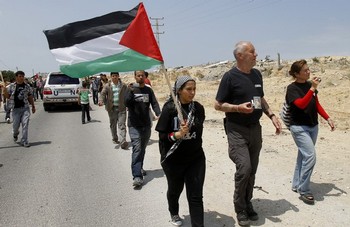Category: Journals
-
Amidst long hours waiting to pass to Jerusalem
25 May 2011 | Shahd Abusalma Last night, I went to bed at 11 pm, much earlier than I’m used to. I forced myself to stay under my blanket. The room was very dark and no sound could be heard but the sound of me moving in bed continually. I wanted to sleep so that…
-
With love and respect from the bottom of my heart to my Italian Family
22 May 2011 | Rewa’ Ahmed Since the day I heard about the Italian convoy that is coming to Gaza I was longing to meet Vitorrio’s friends, and dreaming of the day they would arrive in Gaza. The 12th of May was the arrival day. It was a long day because some friends and I…
-
Nakba day in Gaza
18 May 2011 | International Solidarity Movement, Gaza Nakba Day. The day of the Catastrophe. A day to mark the ethnic cleansing of 800,000 Palestinians from their homes. A day to remind themselves and the world, that one day, they will return to their homes, that they have not forgotten their land. Today marked 63…

